Prisons, war zones and places of suffering are often on Dunja Mijatović’s itinerary as the Council of Europe’s Commissioner for Human Rights.
However, a visit this week to the Greek islands was a hardening experience that stopped her in her tracks.
In an unprecedented statement following her trip, Europe’s human rights watchdog slammed the situation for people living in migrant camps in Greece describing it as "explosive" and "on the edge of catastrophe".
"This no longer has anything to do with the reception of asylum seekers ... this has become a struggle for survival," she wrote.
Around 34,000 people waiting for an update on their asylum applications are being held in overcrowded camps on the Aegean Islands, which have been described as "hell on earth".
Most of them are from Syria and Afghanistan.
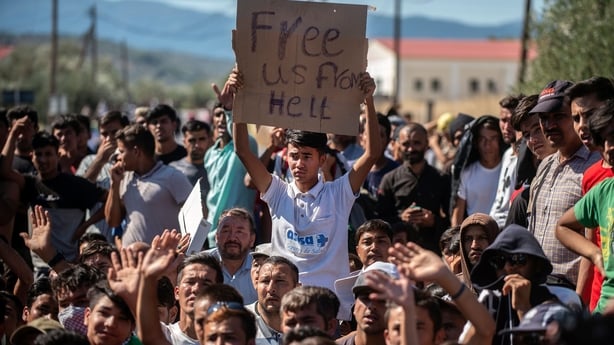
Ms Mijatović told RTÉ News that visiting the Moria camp in Lesbos was not new as she went there in June 2018 and described the situation as "difficult back then".
But this time around, for her, the trip was different. The commissioner said she was not expecting to see what she saw.
The number of rats, children walking around with skin diseases without access to medicine and people living in mud struck her tremendously.
She recounted seeing people queuing for hours for food and having little or no access to toilets and showers.
Commissioner Mijatović said she had to do something after seeing the "unbearable" conditions.
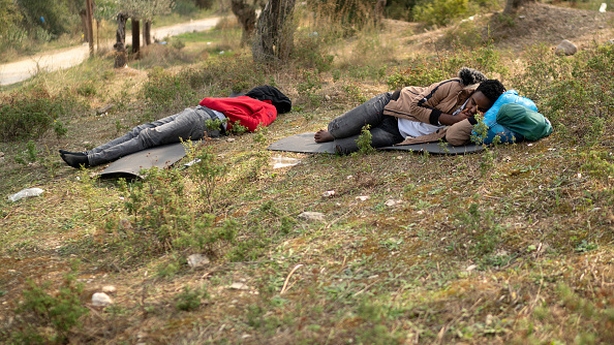
"At least I have to try to give my voice to the voiceless. It’s a security risk but also a health risk," she said.
Many of the stories she heard from those on the ground brought her back to her own country’s struggles.
"[It] reminded me of stories from my part of the world, from Bosnia and Herzegovina, from the time when we were refugees when we tried to look for better life.
"Of course you try to stay at home, but you have to run because you have to save your family who you want to have a better life," she stated.
We need your consent to load this rte-player contentWe use rte-player to manage extra content that can set cookies on your device and collect data about your activity. Please review their details and accept them to load the content.Manage Preferences
Fresh back from her visit, Ms Mijatović has not ironed out her next step, but took aim at those not pulling their weight.
"It’s a visible fact that nothing works. How to change this is for leaders to move on and make some courageous and bold statement in order to stop this suffering," she said.
Ms Mijatović cast doubt over a 2016 EU-Turkey deal that saw Turkey making an effort to stop crossings to Greece in exchange for billions of euro in EU aid money.
However, smugglers are landing boatloads of people on Greek islands.
Almost one million refugees, including many fleeing war in Syria, crossed from Turkey to the Greek islands in 2015. While the numbers subsided over the years, things are heating up again.
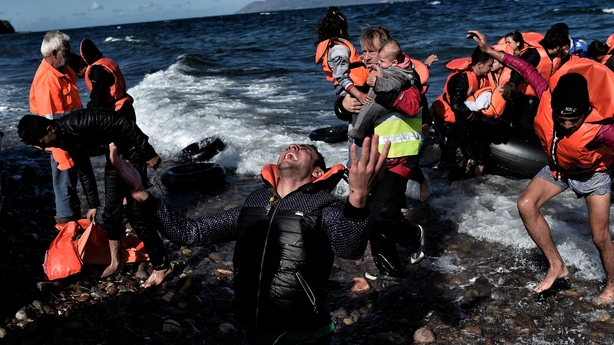
More than 36,000 people arrived to Greek shores since the summer, according to figures from the UNCHR.
Last week, 1,673 arrived on the Aegean Islands, with more than a third from Afghanistan and a fifth from Syria.
In September, seven people died when a dinghy carrying migrants capsized between Turkey and the Greek island of Chios.
As the numbers rise, so does the tension. In October, a woman was killed when a fire broke out in the centre of the Moria camp.
There has also been anti-migrant sentiment growing in Turkey as they house around four million Syrian refugees.
The country's president Recep Tayyip Erdoğan has threatened Europe with a warning to "open the gates" and his plans to create a safe-zone in northeast Syria to resettle millions of refugees, currently in Turkey, also hit headlines around the world.
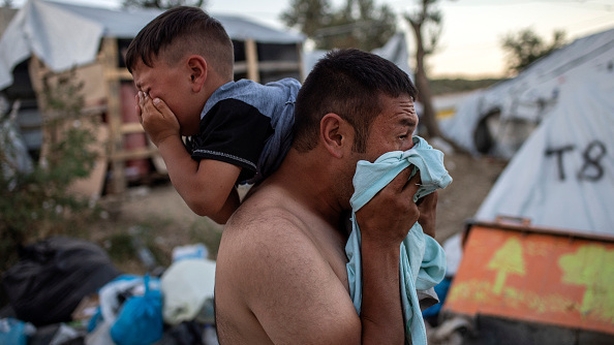
However, Ms Mijatović said there could be "many other factors" causing the problems in Greece. She said there was an "embarrassing" lack of political will and responsibility from some EU leaders.
Ms Mijatović was pointing to a number of countries in eastern Europe who are refusing to take in asylum seekers and refugees, and the Council of Europe’s Commissioner for Human Rights is not the only one targeting them.
European Court of Justice’s advocate general, Eleanor Sharpston, this week singled out Poland, Hungary and the Czech Republic for breaking EU law by refusing to take in people.
"By refusing to comply with the provisional and time-limited mechanism for the mandatory relocation of applicants for international protection, Poland, Hungary and the Czech Republic have failed to fulfill their obligations under EU law," she said.
Ms Mijatović also hit out at the hosting country Greece stating that it "could do better".
With a change in government, the commissioner knows they have an enormous task ahead of them but wants to remind them that there are EU funds to help.
The Greek government has changed tact in recent weeks to ease the crisis.
People have been moved from overcrowded camps to the mainland and it plans to move another 20,000 people by the beginning of 2020.
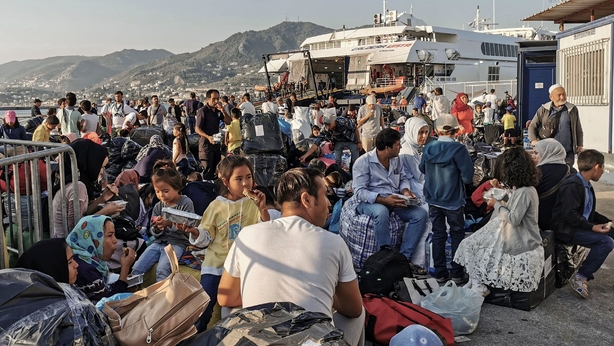
However, the surge in migrant arrivals means that as soon as they leave, the numbers are quickly replaced.
The country also passed a controversial new law tightening asylum procedures this week, with the government stating the new rules would allow it to focus on swiftly identifying refugees that need protection.
The legislation has been widely criticised by human rights groups as harmful to the interests of migrants stating it introduces stricter rules for receiving asylum seekers, delays access to the right to work, narrows the definition of family.
In relation to this new law, Ms Mijatović said she would follow the implementation of the law and said measures to speed up the asylum process were welcome.
However, she claimed it had to be in compliance with human rights obligations.
With Ms Mijatović acknowledging that measures are not working, politicians not moving on promises and conditions becoming more desperate on the Greek Islands, she said Europe needs to move fast.
"Time will tell how we overcome this situation and if is there enough wisdom potential in European leaders in order to show this is a place where human rights are respected. Winter is coming and people cannot continue to keep living in these conditions," she said.






